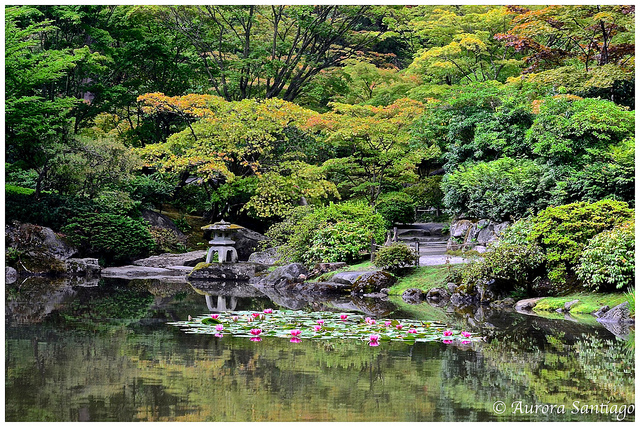Three Reasons Why Jazz and Japanese Gardens Go So Beautifully Together
By Rumi Tsuchihashi
The sound of music changes how you perceive the garden. Hear the Jazz trio led by Marco de Carvalho on July 12, and discover how your eye sees the garden with painting-like detail.
If you've heard live music being played in the garden before, you've probably noticed that something curious happens: With beautiful sound floating in the air, you suddenly see the garden differently. You percieve the garden as if it were a carefully composed, texturally layered, masterful painting in a world-class museum.
The effects of sound in the garden is visually enchanting - and it's why we love to offer our visitors (often for free!) musical programming throughout the year. And this year, the Garden Party: Festival in the Evening Sun will showcase the best of Jazz music in the garden, performed by an accomplished local trio.
Now you may be wondering, why choose live Jazz for a signature event benefiting Seattle Japanese Garden? It seems an unlikely choice - until you learn more.
Here are three reasons why Jazz and the Garden will make a surefire gorgeous pairing at the Garden Party.
1. Romantic poetry is at the heart of both art forms.
The gardens of Japan became a celebrated art form in the eighth-century. Aristocrats in search of a way to elegantly express their feelings - particularly the tenderness, elation and melancholy that comes with romantic love - took to poetry. Nature was a favorite inspiration as well as the metaphor-of-choice for their complex experiences, and much of the poetry of that time was written inside beautiful gardens. Gardens and poetry in Japan have been deeply interrelated ever since.
“I see the exact same attention to detail and nuanced feeling in the (Seattle Japanese) Garden that I do in the most beloved jazz compositions.”
"When I was studying the lyrics to the most beloved pieces of Jazz music," says Marco de Carvalho, who is a well-respected Seattle-based guitarist originally from Rio de Janeiro and leader of the trio performing at the 2018 Garden Party, "I became aware of how much attention to details went into the lyrics. They are works of poetry." With poetry, extreme care must be placed on every word choice to "precisely evoke nuanced and complex feelings."
"This garden is romantic," de Carvalho remarks, "I see the exact same attention to detail and nuanced feeling in the (Seattle Japanese) Garden that I do in the most beloved jazz compositions."
2. Both art forms "organize" the beauty inherent in nature.
When asked what else Jazz and our garden have in common, de Carvalho pointed out beauty created out of organic form. "Birdsong is the music of nature. What I do as a musician is to take something like birdsong as a sound and organize it into a form, a melody. And when the form is in harmony with nature, it creates an emotional experience."
The garden, as de Carvalho sees it (and our Senior Gardener Peter Putnicki agrees) is also trees, plants and water flowing into each other as you would find in the wild - but in a man made form that's harmonious within its own aesthetic composition, and with nature itself. When we experience nature as "organized" into an intentional, melodic form, our bodies recognize the harmony. And as a result we feel very peaceful.
3. These musicians have deep personal connections to Japan and Japanese culture.
For this performance, de Carvalho decided to team up with vocalist Valerie Joyce. Born in Japan to an American father and Japanese mother, Joyce was exposed to classical music through her mother's piano playing and extensive record collection. After college, she moved to Seattle where she regularly appears with a variety of jazz ensembles.
Sample the sounds of Valerie Joyce singing to Marco de Carvalho’s guitar. On July 12, they will also be accompanied by Hans Teuber on the saxophone.
Several years ago, proprietors Masaaki Ishikura and his wife, Hisako, eagerly invited de Carvalho to play regularly at their renowned restaurant, Miyabi. They found his music wonderfully complementary to the finely prepared cuisine they serve. "Brazil has the largest Japanese communities outside of Japan, so I grew up feeling a sense of familiarity," de Carvalho shared, "but this partnership has given me a much deeper appreciation for Japanese culture."
This garden, when it was built 58 years ago, was a result of cultural crossing and connection as well. Without first the World's Fair arriving in Seattle in the 1909, then inspiring some influential garden-lovers in Seattle to advocate tirelessly for a Japanese Garden to be built in the Arboretum, and finally getting the cooperation of the Tokyo Metropolitan Government so that landscape designer Juki Iida could plan (and so that local Japanese-American landscape companies could build) this garden, it wouldn't exist for the public to access and enjoy today.
Romantic poetry, harmony, and cross-cultural connections. Live Jazz resonates beautifully with the landscape of Seattle Japanese Garden. And if you come to the garden during the trio's performance, the garden promises to wow you with every shade of green in all of its subtly contrasting glory, and lead you to experience the loveliness of the garden as if for the very first time - even if it's your one-thousandth.
If you'd like to hear Marco's trio play live while sipping locally-made premier sake, please go and grab yourself tickets to the July 12 Garden Party while they last. Proceeds will go to support the ongoing care of the garden, and ensure that more programming with music remains accessible to all.


